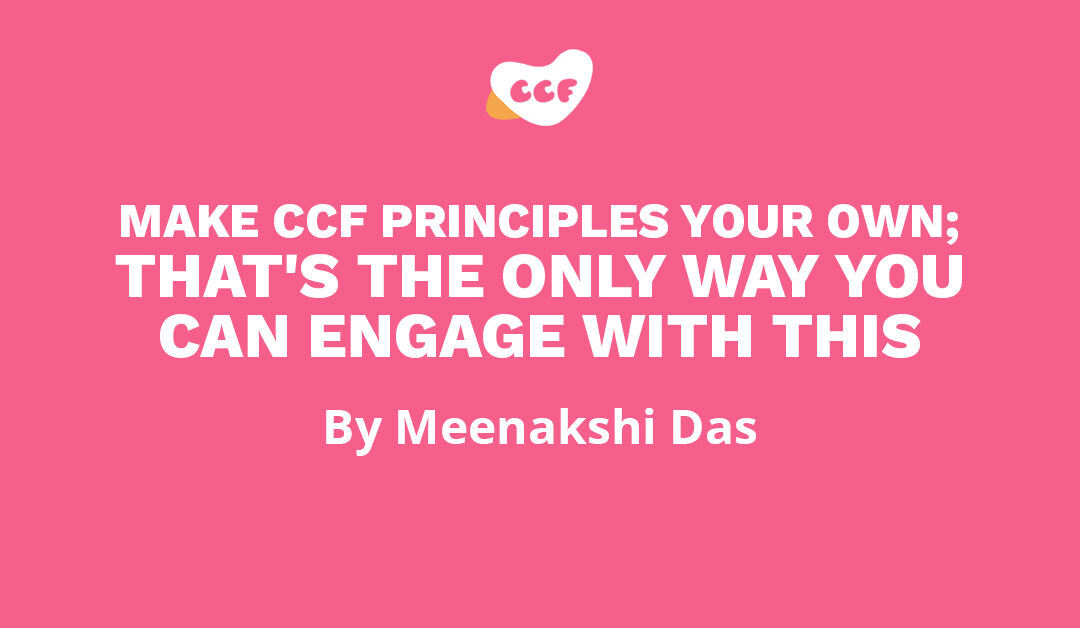By: Meenakshi Das, data equity consultant, trainer, and speaker
To me, community-centric fundraising is an approach centered on community relationships, empowerment, and equity. It seeks to address the historical power imbalances that have perpetuated systemic inequalities and limited the potential of marginalized communities to participate in philanthropy.
I have been in rooms where it took all my energy, plus some to compensate for the disengaged expressions. And it has always bothered me as a BIPOC immigrant woman in this part of the world.
At one of my old jobs, I remember someone unmuting and interrupting the presentation, saying, “I cannot make what she is saying. Can someone translate that for me in our English?” I also recall the first day of a job when my manager told me my onboarding would include “learning more English like North America.” All this after I have three English-based advanced degrees in computer applications, data science, and human-centered design thinking!
I have taken more courses than I remember to cover up for those instances — like I had to learn something more, a bit extra, to be seen enough. Navigating those moments was a lonely experience and very exhausting.
That is until I came across the ten CCF principles.
I cried when I first found the web page with the ten principles. Those bold words challenging traditional defaults stated the most obvious for our field — be human. I remember my heart and mind telling me in those moments — “see, didn’t we say you have always been enough?” Knowing that my ideas to be in philanthropy were ordinary and human — like other strangers of this CCF group felt, too — was empowering.
This article is to share with you my process of owning those principles. Because they need to be yours, deeply and truly, so you can engage well with the core idea — that community is at the center of all.
To me, community-centric fundraising is an approach centered on community relationships, empowerment, and equity. It seeks to address the historical power imbalances that have perpetuated systemic inequalities and limited the potential of marginalized communities to participate in philanthropy. This approach emphasizes building trust, creating meaningful engagement, and promoting shared ownership of fundraising efforts. To fully realize the principles of community-centric fundraising, it is necessary to consider data equity as an integral component.
For me, reading those ten principles started with feeling validated and heard, yes, but they also quickly opened questions. Like:
- What does this all mean for data and data equity?
- Why should I always factor wealth, power, and influence to sort and segment?
- And then why should I sort and segment every time?
- Or is my story (an immigrant with just enough income, a rented apartment, no significant assets, student loans, health loans, advanced degrees, and years of data experience) too insignificant to be considered necessary in the formula of “supporter” and an ”ally”
So, I did what I do best — I went into a rabbit hole of what, why, and how these principles work with the ideas of data collection, reporting, and consumption…
The CCF principles are not end-all, be-all statements. They are evolving and breathing, meaning I needed to commit to continuous learning.
I contextualized the CCF principles with the ideas of data equity, research, and algorithms through my four-step process:
- Understand “why”: I went through each principle and pulled as many themes as possible based on what I agreed with and what I needed to explore more.
- Explore gaps and build accountability: Once I started to grasp the principles’ themes, I applied those lenses to the data practices in philanthropy and beyond. I have worked for over fifteen years in data with different titles and teams. This step was more about identifying the gaps and acknowledging my power to address those gaps. I created multiple “I” statements to design more accountability in my actions with data.
- Create spaces for continuous learning: The CCF principles are not end-all, be-all statements. They are evolving and breathing, meaning I needed to commit to continuous learning. As I progressed in my exploration and design of CCF principles aligned with data equity ideas, I intentionally built spaces where this knowledge could be shared more broadly — newsletters, publications, data equity workshops, and such.
- Surround myself with a community with whom I share this language, knowledge, intentions, and strength: One of the early lessons from exploring the principles was that I am allowed to ask for support. And I realized in this exercise that I need to commit to reaching out to people and communities who share the language, knowledge, intentions, and strengths of learning and living these principles to make my joy in this work sustainable
Going through this process helped me to set the foundation of my consulting practice around data equity. Data equity is a framework for ensuring that data is collected, analyzed, and utilized in an inclusive and equitable manner. And doing good with data requires a commitment to understanding the social, political, and economic contexts in which data is collected and a willingness to engage with diverse perspectives and experiences.
In the context of community-centric fundraising, data equity is essential for ensuring that fundraising efforts are informed by the needs and priorities of the community and that the data used to guide these efforts is not biased or discriminatory.
For example, one key aspect of data equity in community-centric fundraising is collecting and using demographic data. This includes information on the race, ethnicity, gender, sexual orientation, income, and other characteristics of community members. Collecting this data can be challenging, as it requires building trust and establishing relationships with the community. It is essential to approach this process with sensitivity and respect and to be transparent about how the data will be used.
Another example of data equity is the use of data in decision-making. Data should not be used as a tool to impose preconceived notions or goals onto the community. Instead, it should be used to inform discussions and decisions that are driven by the community’s priorities and needs. This requires a willingness to engage with diverse perspectives and experiences and to recognize the value of community knowledge and expertise.
Data equity requires a commitment to transparency, accountability, and continuous learning. This means being transparent about the collected data and how it will be used and being accountable to the community for the decisions made based on that data. It also means acknowledging and addressing biases or shortcomings in the data and learning collaboratively with the community to improve on the gaps.
Owning the 10 CCF principles helps me find my own ways to build a better world.
So, go back to those principles, re-read them, reflect on them, and question them. That’s how you will make those yours.
Because there will always be someone in the room who might think I don’t belong there. But I can also guarantee that learning to center community humanely will also mean you will find another individual in the same room who shares your joy and intentions.
You and I are working for those believers in the room.

Meenakshi Das
Meenakshi Das (she/her/hers) is the founder, consultant, and facilitator at her practices NamasteData and Data Is For Everyone. Her work is focused on advancing data equity for nonprofits. She leads her work with love for the community, respect for her lived experiences and knowledge from decade plus experience of working with data. She supports nonprofits in 3 core areas: data collection assessments, community surveys, and staff workshops on improving data equity (through data collection, visualization, human-centric algorithms, etc.) You can access some of her intentionally designed community resources here. Connect with her on LinkedIn.
Discover more from CCF
Subscribe to get the latest posts sent to your email.


Thank you so much for this Meenakshi, it was powerful to read your words, especially as I’m preparing to speak at APRA PD 2023 on CCF in practice for data. I feel encouraged and will be sharing this with my co-presenter that maybe people will attend our talk and feel seen by the 10 principles in the same kind of way that we all have.